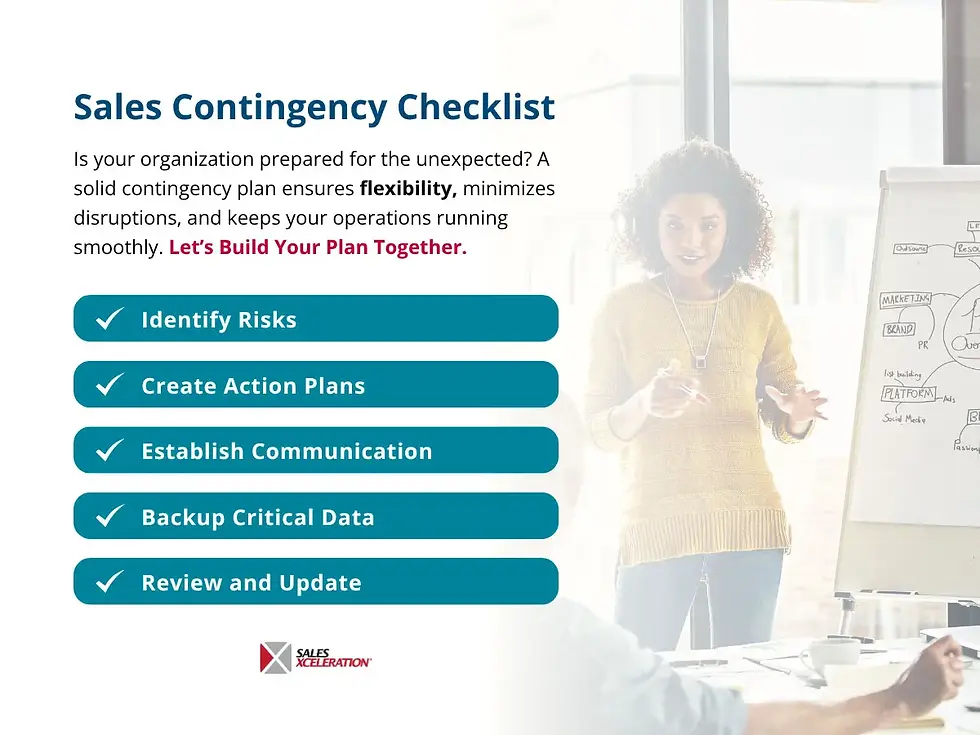The Growth-Killing Mistake: Overlooking a Sales Contingency Plan
- Sales Xceleration

- Apr 15
- 4 min read

It’s not market conditions or missed quotas that silently kill growth, it’s being caught off guard when things change unexpectedly. Most sales leaders don’t realize their strategy is fragile until it’s too late. Picture this: Your top client pulls out, your best rep resigns, or a new competitor drops their prices. What do you do next?
The mistake? No sales contingency plan. In a world where change is the only constant, flexibility isn’t a luxury. It’s the only way to protect revenue and position your team to pivot fast, recover stronger, and keep growing.
What is a Sales Contingency Plan?
Fundamentally, a sales contingency plan is a pre-defined set of actions to be executed when unforeseen circumstances disrupt normal sales operations. It utilizes a flexible and dynamic framework that anticipates change and empowers sales teams with the agility it takes to pivot seamlessly and capitalize on emerging opportunities.
An effective flexible sales contingency plan is proactively designed to be strategically reactive. It aligns seamlessly with your organization’s optimized sales processes, allowing your sales engine to adapt to shifting market conditions and execute course corrections, ensuring sustainable success.
Why is Flexibility Important in Sales?
Sticking to outdated tactics can quickly put your sales team at a disadvantage. That’s why a flexible approach is key—it ensures you’re always ready to pivot when needed. Design your sales approach with built-in flexibility. For instance, if your usual channels – like outbound calls or email campaigns – start to lose traction, it’s important to adjust accordingly. To do so, equip your team with ready-to-use playbooks; think:
short-form video selling,
AI-assisted chat, or
dynamic outbound sequences tailored to shifting buyer behavior
New entrants, innovative products, or aggressive pricing strategies from rivals can also disrupt established market shares overnight. A flexible sales force, however, can quickly:
analyze these shifts,
adjust their messaging,
target new segments,
redefine their value proposition, or
refocus sales channels such as moving from field sales to digital engagement strategies
Without visionary flexibility, opportunities are missed and threats become insurmountable obstacles.

Why is Contingency Planning Necessary?
While flexibility is the mindset underpinning operational agility, contingency planning is the strategic framework that brings order to this agility. Contingency planning acknowledges that things will change – sometimes rapidly. Thus, combining flexibility with robust contingency strategies for sales can minimize risk and maximize opportunity.
In recent years, it has become clear that supply chain disruptions, aggressive new competitive products, or even a global event can drastically impact consumer spending habits. That’s why contingency strategies must be part of a dynamic playbook to equip sales teams with the frameworks and decision-making processes to adapt and flex to meet market conditions.
This might require:
identifying alternative sales channels,
developing backup lead generation strategies,
cross-training sales personnel, and
establishing new crisis communication protocols
Such a proactive approach ensures that when a challenge arises, the response is swift, coordinated, and effective, minimizing downtime and protecting revenue streams.
Why is Flexibility Key to Success?
Organizations that embrace strategic flexibility are more resilient, more innovative, and ultimately, more profitable. This is because a flexible mindset encourages continuous learning and adaptation.
Such sales teams are more likely to experiment with new techniques, adopt emerging technologies (including AI-powered sales tools, virtual collaboration platforms, and more emerging capabilities), and continually refine their sales approaches based on real-time conditions and feedback. This leads to increased efficiency and higher conversion rates.
Contingency planning isn’t just about risk; it’s also about opportunity. Having a plan in place ultimately empowers the sales organization to:
Innovate and adapt as they quickly adjust sales methodologies, product offerings, or pricing strategies in response to market shifts
Optimize resource allocation by redirecting resources to areas of highest potential return
Mitigate risks by proactively addressing potential threats and diversifying customer portfolios and sales channels to reduce dependency on single points of failure
Enhance customer satisfaction by responding rapidly to evolving customer needs and preferences
Foster resilience by building an organization that can not only withstand disruptions but also emerge stronger from them
Having a plan is essential, yet it’s useless if it just remains a document on paper. Make sure to communicate your contingency plan to the entire team, not just top leadership.
Assign roles and responsibilities clearly
Run simulations for various potential disruption scenarios
Establish a system for feedback where team members can share what is working and what needs improvement as time goes on
When your team understands the contingency plan, they’re not just reacting to disruption, they’re ready for it.
The Bottom Line
When it comes to sustainable sales success, a contingency plan is key! It is the functional mindset, focused on proactive readiness, not reactive panic, that recognizes and effectively responds to change by executing contingency planning.
By embedding flexibility at the heart of your sales contingency plan, you not only prepare for the inevitable bumps in the road but also empower your sales teams to seize opportunities, optimize processes, and ultimately, drive sustainable growth in an ever-changing world.



